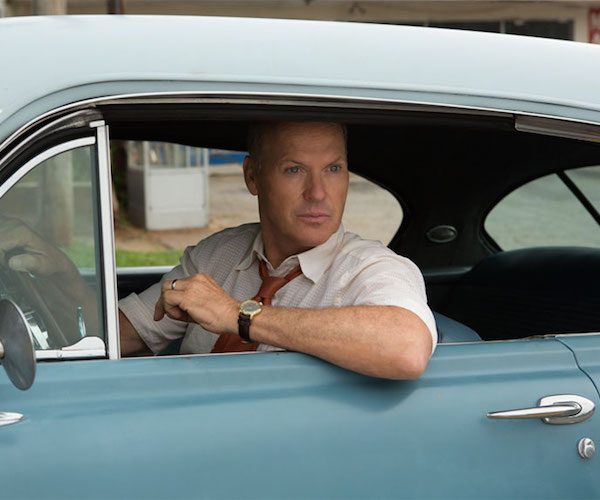Film Review: “The Founder” — The First Trump Movie? No and Yes
I ask you, thinking of The Founder: is it just a coincidence that the name Donald is imbedded in the name McDonald’s?
The Founder directed by John Lee Hancock. Screening at Kendall Square Cinema, AMC Loews Boston Common, and elsewhere around New England.

Michael Keaton in a scene from “The Founder.”
By Gerald Peary
“The first Trump movie!” I’ve heard pundits declare about a dozen recent films, and it’s certainly understandable in our paranoid times to believe our evil 45th president is darkening our cinema as we speak. I ask you, thinking of The Founder: is it just a coincidence that the name Donald is imbedded in the name McDonald’s? Whatever, can we assume then this fairly engaging Hollywood film about Ray Kroc’s building of his hamburger mega-empire should be interpreted as an ominous allegory about our wheeler-dealer billionaire Chief Executive?
No and yes.
The Kroc (Michael Keaton) of the first part of the John Lee Hancock-directed film is no Trump. He’s just another 1950s sweaty middle-class guy chasing the American Dream. He’s got inventions up the kazoo, and none of them catch on; and his traditional stay-at-home wife (Laura Dern) is frustrated that he never stays home with her, that he’s always on the road. She wonders, what’s wrong with their life? Mr. and Mrs. Kroc have a large lovely house in a Chicago suburb, and even a membership at the local country club.
Ray Kroc wants more. One day he discovers it, driving into San Bernardino, California. It’s a hamburger joint with a cozy name, McDonald’s, run as a hands-on pop-and-pop operation by middle-aged brothers, stern Dick (Nick Offerman, the film’s most acute performance) and softy “Mac” McDonald (John Carroll Lynch, also excellent). The most winning scene in The Founder is from Kroc’s astonished POV when he walks in and about, mesmerized by the balletic efficiency of beef patties sizzling on the grill, then hit with a dot of mustard and another of ketchup, then garnished with two pickle chips on a warm tasty bun, and the whole juicy thing wrapped up and ready for the customer in all of 30 seconds.
The McDonald brothers have the perfect product, and choreographed delivery of that product, but not the capitalist vision. They’re satisfied with one restaurant that works to the creation of many that don’t meet their control-freak standards. They actually tried out several other McDonald’s which faltered, including one in Phoenix, Arizona, with a golden dome of Dick’s design. Well, enter Ray Kroc. Like the guy who says “plastics” to Benjamin in The Graduate, Kroc also has a one-person business philosophy which he tosses out to the McDonald brothers: “Franchise!” He persuades them to sign on the dotted line, and the three become, in 1954, shaky partners in what becomes a national operation. When they get the kinks out, that translates as McDonald’s franchises everywhere looking exactly alike, all sporting the golden dome, and all selling the identical three profitable products: burgers, fries, and soft drinks.
Ray Kroc’s philosophy of McDonald’s (at least according to Robert Siegel’s sometimes too-clever screenplay): “It signifies family, it signifies community. It can be the new American church, feeding bodies and souls, and it ain’t just open on Sundays. It’ll be open seven days a week.” Kroc recruits people to work at McDonalds and to run McDonalds, with a platitudinal spiel right out of the playbook of Norman Vincent Peale: “”I’m looking for those with fire in the belly, people not scared to roll up their sleeves, opportunity knocks, the skies the limit, if you have the guts, etc.”
In the first half of The Founder, Ray Kroc is a bit of a con man and not particularily likeable, but you’ve got to respect his drive and chutzpah. In the second half, he loses us completely with his vanity and dishonesty, including him screwing over both his wife and the nice-guy McDonald brothers with his ruthless, mercenary ambition. And at this point it’s fair to ask: did the filmmakers as they were shooting in 2016 take into account the ignominious rise of Donald Trump? It feels like it.
Is that why Ray Kroc becomes irredeemably awful? Why his new obsession is “winning” and having every business transaction be “triumphant”? Why he declares, “Business is war” and that “If my competition was drowning, I’d walk over and put a hose right in his mouth”? Why he brags: “I’m in every state! National!” Why, taking credit for everything, his McDonald’s business card is an alternative fact: “Ray Kroc, Founder.”
Michael Keaton takes it easy through much of the movie, not doing that much with his part, which is OK. But you can feel him get revved up when Kroc goes really bad. Who doesn’t have fun playing such a taunting bully, such a consummate bastard?
And where does it all end? A spoiler alert, perhaps.
Interestingly, filmmaker Hancock drops the mocking of The Donald for something less ephemeral, placing the fall from grace of Ray Kroc within the context of cinema. There’s a scene in which a morose Kroc walks past a mirror which certainly alludes to capitalist baron Charles Foster Kane, a walking dead man, dragging his body through the Hall of Mirrors. Listen closely in The Founder and there’s somber complementary music evoking Bernard Herrmann’s score for Citizen Kane.
Gerald Peary is a retired film studies professor at Suffolk University, Boston, curator of the Boston University Cinematheque, and the general editor of the “Conversations with Filmmakers” series from the University Press of Mississippi. A critic for the late Boston Phoenix, he is the author of nine books on cinema, writer-director of the documentaries For the Love of Movies: the Story of American Film Criticism and Archie’s Betty, and a featured actor in the 2013 independent narrative Computer Chess.
